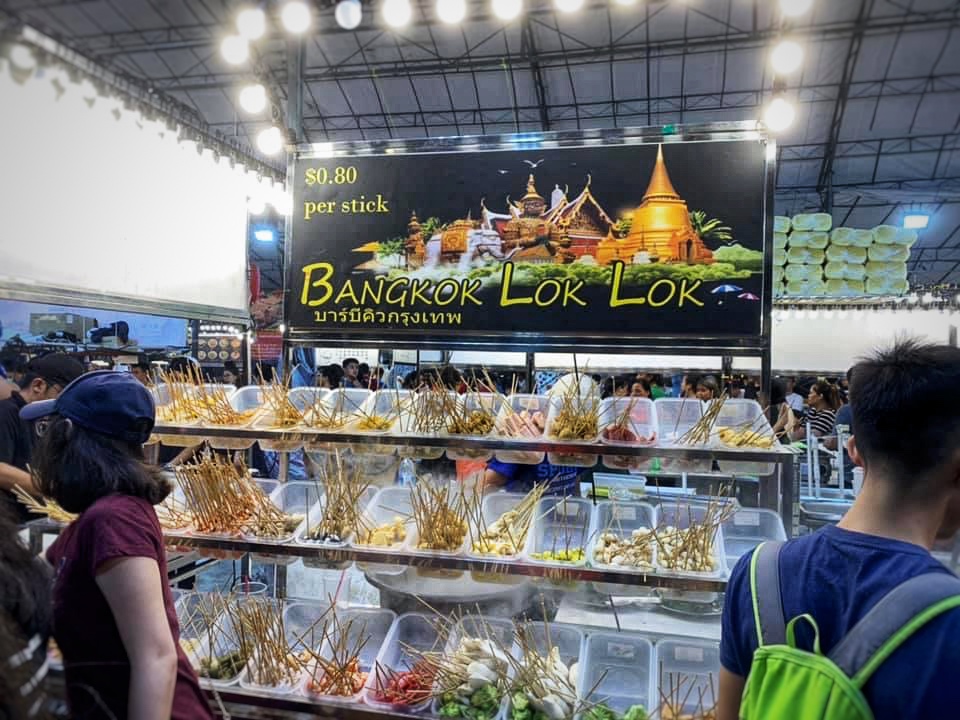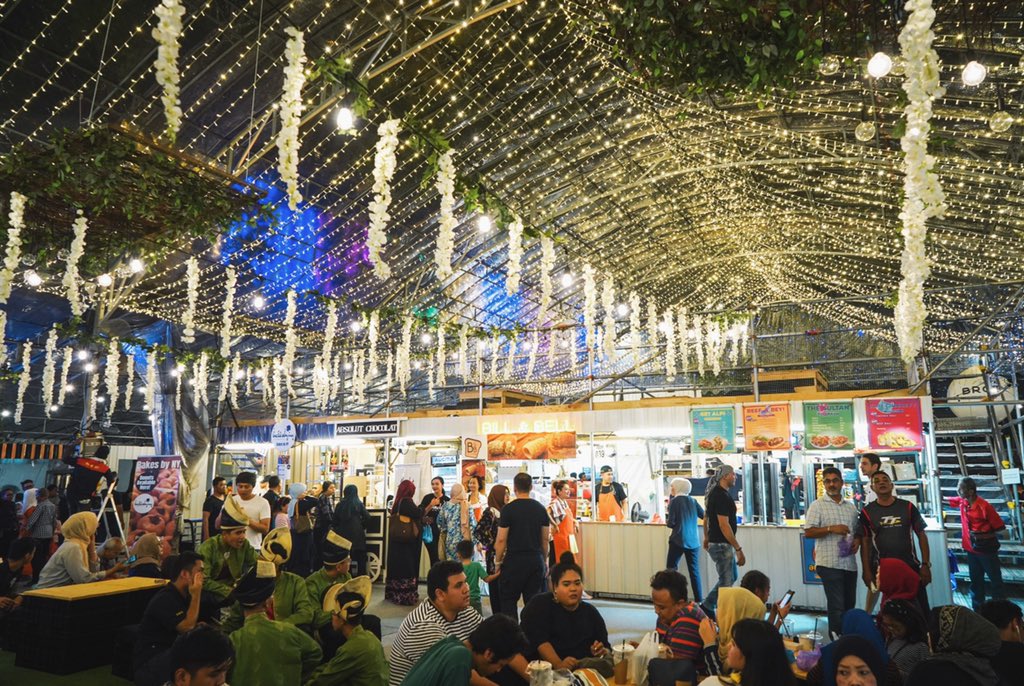Top image and all images by Vanessa Ng unless otherwise stated
Act I: The good ol’days
There used to be a time when unannounced gastronomic pop-ups were a thing. There was neither a spread of promotional materials nor an infectious pre-event hype on social media—they just went viral along their own cosy street.
These flash bazaars simply showed up and, literally, brightened up the neighbourhood.
ADVERTISEMENT
There would be a mish-mash of food across cultures gathered at the hotspot. Some say it is experiential dining at its finest, while others swear by its theatrical chefs. I have heard stories of individuals intoxicated by the amalgamation of eclectic dishes, and people who revisit the kaleidoscopic madness every day until the tent of flavours gets torn down.
Pasar malams are, no doubt, a perpetual delight to all senses.
With no entrance fees, no minimum spend and no dress code, anyone is entitled to soak in the festivities of this roving fair.
If the pasar malam (Malay for night market) were a person, it would don the army admin shirt in a trademark shade of green. It would pair that with neutral coloured shorts and complete the look with worn-out slippers, flip-flopping its way to gatherings of all formalities. I see the fella as an unpredictable and carefree one, pangseh-ing or appearing at whim.
Do you remember that feeling of excitement and anticipation two years ago? You never needed pasar malams, but they made your neighbourhood a little more interesting and for a month, you looked forward to coming home a little more.
Act II: The long goodbye
Pasar malams, alongside many other small businesses, were forcefully erased overnight thanks to a virus. Its disappearance was further solidified over the years as variants emerged.

In 2021, after a period of uncertainty, a few brave vendors put up permanent stalls. The rest chose to switch trades or get by with part-time or delivery jobs. Some vendors pivoted the business online through live stream selling over Facebook, or by taking online orders through a home business. This was even more difficult for sellers of household goods or clothes as they lacked points of differentiation.
Some popular pasar malam brands moved on from the nomadic nature of the trade with doubts about signing a new lease during the pandemic. But even well-known vendors were unable to secure a steady demand as they did previously. While loyal customers initially travelled to satisfy their cravings, sales did not last.
This is unsurprising given that a temporary food fair is enticing precisely because of its lack of permanence. With a fixed stall, patrons have no sense of urgency to buy the food in-situ.
Their efforts, however, yielded poor results when the 2020 proposal detailing a safe resumption of pasar malams was not approved. Multiple industry veterans also shared that they felt abandoned and invisible.
While not many vendors have had success stories throughout the pandemic, some prefer the reduced but predictable income that comes from having a fixed stall, as opposed to living month to month at pasar malams.
ADVERTISEMENT
Act III: A perpetual uncertainty for pasar malams
With the ever-changing Covid regulations, it is uncertain when pasar malams will come back. Even if they do return, we need to be realistic. Gathering vendors will be an uphill task—some are now bound to contractual rental agreements or have entirely moved on to new ventures.
Every ex pasar malam vendor has their own story of struggle. So does 28-year-old Ms Raudhah Putri, who manages Bogeh with her 52-year-old father, Mr Sulkiffle Sa’ad. The stall sells soft and crispy lekor and pisang goreng, which they learnt how to make from their late uncle, who had been running the business before Raudhah was born.
Before taking over the business from their uncle, both daughter and father were doing engineering work in the oil and gas industry. Raudhah’s father resigned from his full-time job to focus on the business, only to have Covid-19 thwart their plans less than a year into operations.
Through hard work and the help of their family, the duo ran successful pasar malams all across Singapore. The business was booming, and sales had never been better. Then, like an abrupt plot twist in a drama, Covid hit.
“My father was helpless,” she confessed.
With everything in limbo and no end in sight, Raudhah’s father was forced to seek alternative sources of income. Customers were asking if Bogeh had home deliveries, but shifting the business online meant sacrificing the quality of their products. The Malay snacks that they were proud of are, after all, best when freshly cooked.
Neither could Raudhah’s father return to the oil and gas industry as the sector was suffering. Wanting to provide for his family of five, he turned to parcel deliveries, carrying heavy boxes and delivering them to homes and offices islandwide. Sometimes, he would have difficulties fulfilling the minimum number of parcels to be delivered and had to reach home past midnight.
The fifty-year old’s back was filled with pain, and his body was always sore. Raudhah’s sister helped him once and realised quickly that the job was too exhausting even for herself.
“It was hard for my family, seeing all these,” Raudhah said. “It’s difficult.”
Steering away from physically intensive labour, Raudhah’s father decided to apply for an entry-level factory job at a global data storage company. The hiring manager told him that he was overqualified during the interview, but he didn’t care. All he wanted was a job with a stable income. Throughout his interviews, he had to explain the gap of employment in his resume when his pasar malam business was put on hold due to Covid.
To make matters worse, Raudhah still had payment obligations for Bogeh. For the past two years, when pasar malams were suspended, Raudhah made monthly payments to a storage unit where she keeps all their equipment such as the food stand, cooking equipment, banners and more. The storage prices were increasing every month, and it was getting more and more taxing.
“Everything is uncertain. We hope, but we have no way to foresee.”
Now, Raudhah’s father is working full-time back at his original workplace. The family took two whole years of detour and hardship to go back to life as usual.
It must not have been easy for Raudhah to summarise a two-year-long painful journey. I recall a point when she shared how she completely blocked out the memories of when her father worked in delivery. Those were, indeed, harsh times.
Despite all these, Raudhah understands why pasar malams had to be closed. After all, pasar malams involved not just crowds but mask-off eating and chatting. The risk of spreading Covid was clear, but that does not remove the hardship that Raudhah’s family had to undergo.

Act IV: A Kampung spirit
Pasar malams are very much like kampungs. The camaraderie amongst vendors is formidable.
“We help each other a lot. After Covid happened, most people got scattered, but we stayed in touch. We support each other, and we talk,” Raudhah shared.
This is the culture in pasar malams. The members form a close-knit community, almost like a support group. Vendors typically do not even accept money from fellow vendors and simply exchange food with each other.
Raudhah recalls an old Chinese couple running a Takoyaki stall. She wonders if they can continue to set up a pasar malam stall should it be allowed to resume. They may have used up their savings amidst Covid. While the old couple could have gotten government funding, Raudhah was unsure if they knew how to.
This was a common problem faced by many older pasar malam vendors who may not be tech-savvy enough to access government funding. They needed help from their kids or extended family to make sense of the otherwise confusing and lengthy document submissions. Even while Raudhah was researching eligible government funding for herself, it was not easy. She felt that it could have been more accessible.
Pasar malams mean something much more profound for Raudhah and her family. After her family members moved out, helping out at the stall as a family became a time to bond and reconnect. Whenever heavy boxes were to be shifted, Raudhah’s brother would come by to help. When they needed more manpower, her family would always support them.
Raudhah recalls how her sister would call her randomly, “Kakak, come over after work, I’m so tired,” and she would come by to help immediately. There would be laughter and chit chats at the stall. The business created opportunities for the family to interact, bringing them all closer.

Pasar malams are part of our cultural fabric
In a young country like Singapore, there are not a lot of cultures or practices that we can confidently term as ‘uniquely Singaporean’. It is the little habits and recurring events that we may have failed to notice that contribute to the formation of our culture. While we don’t realise this, simple pleasures like pasar malams actually form a distinctive part of our Singapore culture.
The disappearance of pasar malams begs the question of whether we did enough for them over the years. As restaurants and kopitiams gradually adapted to operations amidst Covid, pasar malams were left out. When restaurants and kopitiams had vaccination checks for group dine-ins, limited entry numbers, and socially distanced patrons, why did we not keep pushing similar measures to be adopted in our pasar malams? Through these difficult pandemic-laden years, having small scale pasar malams, or even integrating them as small pop-ups within kopitiams, would likely have been beneficial to both the vendors and our demoralised nation as a whole.
Any culture will be forgotten and lost if not actively preserved
With the loosening of Covid restrictions, we can remain hopeful about the return of pasar malams. When they come back, if they ever do, let us do our part to keep them here.
The call to support small local businesses is not new. However, seeing all pasar malam vendors disappear for two whole years injects a real sense of urgency. The threat of losing our small local businesses is, indeed, genuine. Bringing them back will be a challenge on its own.
In the meantime, I can only hope and wait for herd immunity. Raudhah is optimistic and believes that pasar malams will return at some point. “Because It’s part of us. It’s in our blood for Singaporeans to have pasar malam. It’s a lifestyle. We have to be patient,” Raudhah said.






